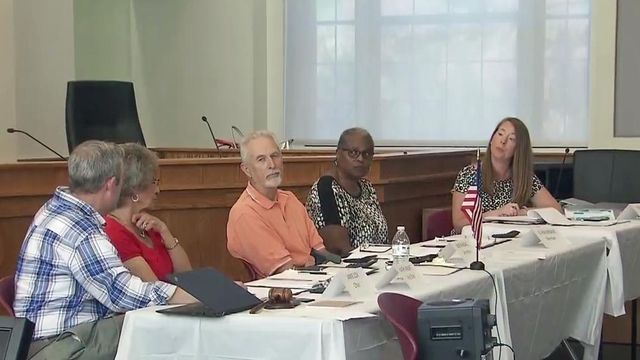Wake, Orange counties deadlock over early voting plans
Republicans and Democrats on the Wake County Board of Elections fight over an N.C. State voting site. Without a unanimous plan, the issue goes before the state board.
Posted — UpdatedIn Wake County, the two Democrats on the board wanted a voting site on the North Carolina State University campus. The two Republican members didn't.
Weekend voting hours were the sticking point in Orange County.
"Honestly, weekend hours are very important in terms of turnout. We have a lot of folks, in terms of voters per hours, who vote on Saturdays," said board chair Jamie Cox.
Local elections boards across the state are setting these plans ahead of the November general election, which will decide control of the General Assembly and the fate of six amendments proposed to the state constitution. Any of these bipartisan boards that don't reach unanimous plans cede their decision to the state board, which leans toward Democrats after a bitter back and forth in the courts between the Republican-controlled General Assembly and Democratic Gov. Roy Cooper over the board's makeup.
Tuesday's deadlocks were predicted by critics when the General Assembly moved away from local boards with odd numbers favoring the party of the sitting governor. But not everyone has been unable to reach agreement: Guilford County coalesced Tuesday behind a plan with nine early voting sites, according to The High Point Enterprise.
Greene, Madison and Person counties have also reached unanimous decisions, according to the state board.
Wake County's board spent three hours on the issue Tuesday between public comment, board debate and recesses. In the end, Democrats insisted on the N.C. State site at the Talley Student Union, and Republicans were opposed, citing poor parking and the fact that the plan had two other sites inside the Interstate 440 Beltline.
Republican members Eddie Woodhouse and Keith Weatherly also cited budget concerns, given a General Assembly mandate to increase the total early voting hours this year. But Chairman Greg Flynn said his plan, including N.C. State and also backed by board member Erica Porter, was $30,000 cheaper than the one Woodhouse and Weatherly wanted, which would have kept the same locations used in the 2014 election.
No one disputed Flynn's figures. Both plans would have nine early voting locations; the difference in price was because one of them in Flynn's plan is smaller, with fewer staff on hand. Both plans would have cost a little north of $1.1 million.
In Orange County, critics worried that the longer voting hours during the week may push counties to save money elsewhere, by cutting down on the number of voting sites or on weekend hours.
"It's also tempting to say that would be a way to cut down the number of people voting in Orange County, and that would be very sad," said resident Lewise Busch.
Wake County's board ended up with 18 days of early voting: 12 hours mandatory each day during the week and options for county boards on weekends. Local elections officials, including Flynn, warned that the new requirements could lead counties to approve fewer early voting sites because of the extra costs of staffing locations for 12 hours a day instead of the usual eight.
The local boards can forward non-unanimous plans to the state board, but the state board doesn't have to pick one of those plans.
“It’s anybody’s guess" what the body comes up with, Orange County Board of Elections Chair Jamie Cox said.
Related Topics
• Credits
Copyright 2024 by Capitol Broadcasting Company. All rights reserved. This material may not be published, broadcast, rewritten or redistributed.






